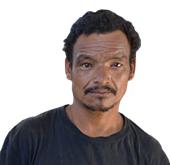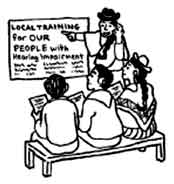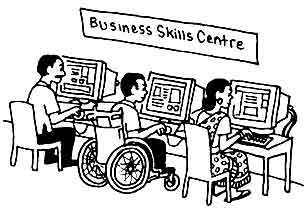Your progress
0%
The activities below represent some strategies your organization can use to support skills development in the communities you serve.
Use your mouse or keyboard to expand each of the activity headings below. To add an activity to your action plan, select the Add button beside it.

Many young people learn vocational and life skills through home-based activities, where knowledge, skills and attitudes are passed on from parents, siblings and other family members. Home-based “learning-by-doing” is fundamental in preparing an individual to learn further skills for his or her livelihood.
CBR can play an important role in helping to understand the potential of a family member with a disability to learn skills so that he or she can contribute to the household in a productive way.
Possible activities are:

Basic education provides the foundation for developing or upgrading technical skills and acquiring life skills. In order to assist people with disabilities to prepare effectively for and engage in a livelihood, CBR should promote access to formal and non-formal educational opportunities as a major priority.
CBR can also facilitate the transition from school to work by facilitating apprenticeships and on-the-job training opportunities.
Secondary schools sometimes offer vocational education courses as well as vocational assessment and career guidance and counselling. Students with disabilities should have the opportunity to enrol in such vocational courses and benefit from career guidance services. They should also have an opportunity to benefit from transition programmes for youth from school to work. CBR should explore such possibilities at local secondary schools and facilitate the participation of students and young people with disabilities.
It is important to identify skills development opportunities in the local community first, either by using existing, mainstream training services, or by contacting local people who are already engaged in a production or service activity and who are willing to teach people with disabilities as apprentices.
CBR should first identify individuals with disabilities who are interested in learning a skill, then:
Learn about the system of vocational skills training that was developed in Malawi.


The Malawi Council for the Handicapped (MACOHA) initiated a system of vocational skills training in its CBR. In targeted rural communities, youth and adults with disabilities were identified, their vocational interests determined and master trainers in the community contacted and encouraged to take one or more apprentices with disabilities for a 1–2 year period. As an incentive, the CBR provided each master trainer with materials to use for both training and production. A variety of master trainers participated in the scheme, including:
Selected master trainers were invited to upgrade their own skills through participation in training courses offered by a vocational rehabilitation centre operated by MACOHA.
Some of the trainees started their own activities upon completion of their apprenticeship, while others were employed by their trainers.
Self-employment in a small business in the informal economy may be a viable income-generating option for many people with disabilities. If an individual chooses this option, it is essential that he or she undergo appropriate business skills training. Small-enterprise development training programmes are found in most countries, often linked to microfinance schemes. CBR needs to identify available training courses locally and raise the awareness of those running them about the potential of people with disabilities as entrepreneurs. With programme managers and trainers, they can develop ways in which individuals with different types of disabilities can participate.
CBR can also help to overcome any obstacles to the participation of individuals with disabilities by providing support such as transport or sign language interpretation as required.

Skills development by people with disabilities is more effective when it takes place in an inclusive environment – training together with non-disabled peers. Training in mainstream vocational training institutions usually offers:
Formal vocational training centres are often located in towns and cities and are geared to the skill needs of larger urban enterprises. But there are also many local government, nongovernmental organizations and community-operated and private vocational training centres in rural areas with courses that provide useful training in technical and core life skills.
CBR should promote access to mainstream training opportunities in vocational training centres for people with disabilities, who usually face barriers in enrolling in such institutions. These barriers include:
CBR can encourage people with disabilities to apply for training in vocational training centres by:
CBR can encourage and facilitate vocational training centres and courses to increase access for people with disabilities. For example, centres can be encouraged to:
Learn about the support trainees were provided during a training programme conducted in Nigeria


The Ibadan Community-based Vocational Rehabilitation programme (CBVR) in Nigeria involved representatives of:
Sensitization campaigns were held in target communities to encourage people with disabilities to register for skills training. A screening process assessed their capabilities, their vocational interests and the level of family support available to them. Selected participants were enrolled in local vocational training centres.
While in training, the trainees received a training allowance from the programme. Courses ranged from 6 to 12 months and included:
The CBVR Committee encouraged beneficiaries to save a portion of their allowance by helping them to open savings accounts. Upon graduation, most of the trainees used their savings to purchase items needed to support their income-generating activities.
During its first 10 years of operation, over 200 trainees received training, and many graduates became trainers in the programme.